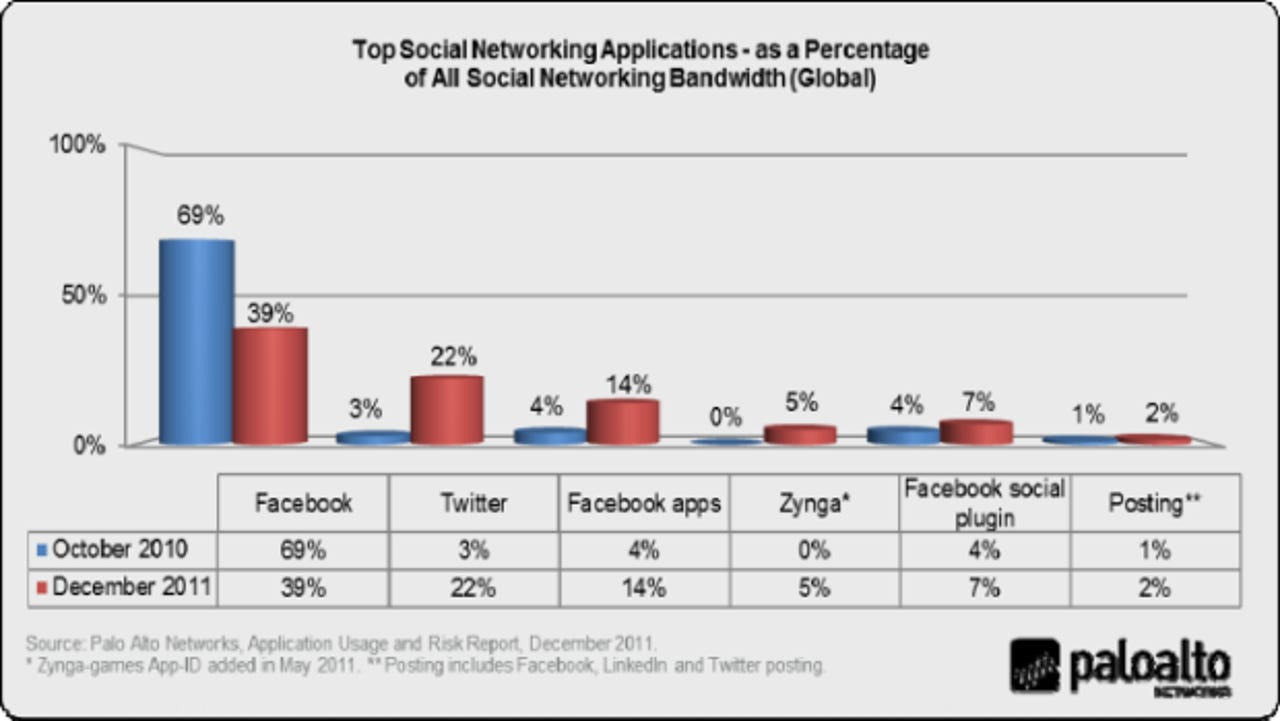Facebook app traffic triples at work (report)

The percentage of social networking bandwidth consumed by Facebook apps has more than tripled in the work place. In fact, it has grown from 4 percent in October 2010 to 14 percent in December 2011, according to a 22-page report titled "Application Usage and Risk Report (8th Edition, December 2011)" by network security vendor Palo Alto Networks.
Worldwide, Facebook accounts for 80 percent of the social media traffic in the enterprise. The numbers come from network usage tracked at more than 1,600 firms between April 2011 and November 2011.
Previous reports showed that the use of social networking was voyeuristic in nature; users would watch their Facebook Wall while at work but would not be actively posting, using plugins, or apps. As you can see in the table above, data from December 2011 shows a significant shift in traffic when compared with data from October 2010.
Social network haters will immediately jump to the conclusion that employees are wasting time playing Facebook games, but Palo Alto Networks believes there's something else happening. While Facebook games are undoubtedly being accessed during work hours, many businesses have developed Facebook apps as an extension of their marketing and services offerings, to reach new markets, to support existing customers, and to strengthen relationships. The company gave five examples of what employees are using the social network for:
- CareFirstDance: an app to encourage and help policyholders track their dance activity, capturing the growth of dance as a means of staying fit. This is an instance where a company is using social media for both marketing and cost savings purposes. By encouraging members to dance, exercise, and pay attention to their health, CareFirst has a public health effort that helps the brand, and by having ultimately healthier members who need less care or at least less expensive care, and thus lower costs – giving the company a bottom line benefit. That being said, should employers limit how long employees can dance for?
- Ford Social and Mustang Battle apps: attract and retain customers with image-building and brand-building games and social media activities. Customers are invited to share the passion they have for Ford's products. The use of this app improves Ford's top line revenue by attracting new customers, but more importantly, cements the relationship with existing customers, ensuring they buy again.
- Caterpillar uses social media to tap into their customers' professional/personal interests. For example, the company talks about big jobs/projects, big new gear, and engineering feats of brilliance. Rather than simply pushing their products, Caterpillar appeals to their buyers' love of their jobs, and their successful use of products to complete a big project via social media.
- Zynga-games: this set of Facebook apps was found in 53 percent of the participating organizations and consumed roughly 5 percent of the total social networking bandwidth. Unlike the other apps observed, these games are entertainment-focused, and as such may warrant more scrutiny and control from an app usage policy perspective.
- Nike+ Challenge: a Facebook app that helps runners break out of a training rut, reach new goals, and stay motivated through a group challenge. Users agree upon a running related challenge then use the app to track progress, post updates, and encourage (or talk smack) to the others who are participating in the challenge. An employee that takes a few minutes to use the Nike+ Challenge app at work to post their fitness progress is clearly not performing their daily tasks, but studies have shown that fit employees are more productive. Should this app be blocked?
If you work at an enterprise, please share: what's your company's policy for social networks? Is it effective, in your opinion? Would you change anything?
See also:
